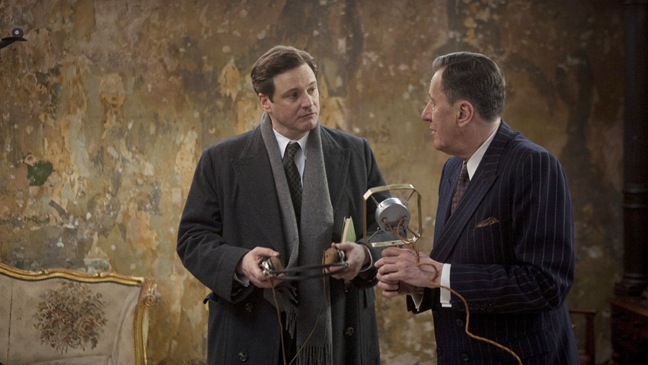The Best of Pictures: The King’s Speech (2010), by Josh Long
4 Mar
THE KING’S SPEECH (2010)
Directed by: Tom Hooper
Written by: David Seidler
Starring: Colin Firth, Geoffrey Rush, Helena Bonham Carter, Guy Pearce, Michael Gambon, Timothy Spall
In 2010, the Oscars were coming off a year with some big changes – the bump up to ten Best Picture nominations, inclusion of some big-budget crowd pleasers in addition to artsy “prestige” films, and a different kind of Best Picture; a small scale summer release about soldiers in Iraq. It seemed like maybe Oscar was moving in a new direction, the beginning of a new era. But old habits die hard, and whether it was for good or not, the Academy Awards went back to business as usual with The King’s Speech.
The film is based on historical events. King George VI (Colin Firth) had a debilitating stutter, which made it difficult for him to speak in public. Of course this becomes a much more serious problem when the King’s most important role is to speak for and to his people. In a world where governments are run by politicians instead of monarchs, the King acts almost as a figurehead more than anything else. And with the new emerging technology of radio, the King is now required to present himself as that figurehead before the entire nation. So Bertie, as he calls himself, seeks out and undergoes speech therapy with the unorthodox Lionel Logue (Geoffrey Rush). It’s at heart a story about a man placed by birth in a position where he doesn’t fit, and the lengths he must go to in order to fit his shoes.
I would say the film overall is good, not great. The element that I can legitimately call “great” is the acting. Firth and Rush have most of the movie to themselves, and both give stellar performances. As a character with a stutter, Bertie could be overplayed or made into a caricature 1. But Firth has done his research, knows what a stutter (George’s stutter, specifically) should sound like, and plays it with realism. Rush’s character seems a little silly when we first see his practice, but we are given more scenes of his regular life to give him some depth.
The themes explored, though not particularly challenging, still send an interesting message. Most notable is the idea of being called on to do something out of your comfort zone. From a Christian standpoint, that can be seen as coming to terms with God’s plan for your life, even when it goes against what we want. Bertie is uncomfortable with the vocal training, and even more uncomfortable with wearing the crown. He has to rise to the challenge, face the occasion, and be who he was called to be.
While the story is mostly enjoyable, there are a few moments when the script gets smarmy. We should forget that it’s a movie and see it as historical events, but these moments put things the other way around. There is the sequence from the film’s trailer where Bertie shouts “Because I have a voice!” and another scene where the film recaps all of Lionel’s previous methods before the climactic final speech. Both of these sequences seem less like something a real person would do, and more like something you might see in a movie. At very best, it’s inconsistent with the rest of the film.
The Kings’ Speech has drawn the most ire for its Best Director win. While anyone can see that the directing “works,” it’s not gripping, it’s not groundbreaking, it’s not moving – it’s just there 2. It works, but it seems little more than adequate. Other films released the same year, most notably The Social Network, had stand-out directing by experienced auteurs. Many people, myself among them, feel that the Best Director award was undeserved, even though it’s a pretty good movie overall.
If I were picking the winners, The Social Network would have been the big winner for 2010. The issues raised in Aaron Sorkin’s script were much more challenging and timely. I’m not a big fan of Facebook, but it’s something that has become a gigantic part of our culture, and in exploring its origins, The Social Network explores something about our culture, and exposes some things about it we might not like to deal with. The King’s Speech is an inspiring true story, but it doesn’t speak to today’s America the way that Social Network does. Besides, David Fincher’s lush, moody direction is a perfect complement to the complicated waters of modern business arbitrations. He brings that same style known for directing serial killers and anarchists, and applies it to twenty-somethings who seem to young to be double-crossing each other for millions of dollars.
The King’s Speech hearkens back to our past, and highlights and unlikely friendship. But the friendship is easy; it’s the kind of movie friendship we’ve seen before. The Social Network questions the idea of what it means to be a friend in the modern world, and challenges us – are we comfortable with this? As is sadly usual, the Oscars are looking back to the good old days, instead of focusing on where we’ve ended up.
1. It is also noteworthy that the stutter doesn’t become the whole point of the story. A weaker screenplay could have easily been only about him overcoming the stutter, with every scene pointing towards that end. But it explores his insecurities about being king in the first place, his rocky relationship with his brother, his unwillingness to give an inch of submission. All of these struggles give him more depth than just “a king with a stutter.”
2. You can hear Tyler and myself talk more at length about this on episode 44 of MTOL.




No comments yet